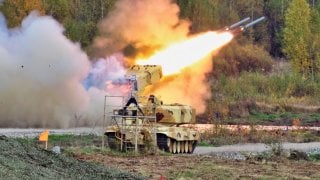North Korea’s Combat Role in Ukraine War Intensifies Nuclear Threat
North Korea’s active involvement in the Ukraine War, marked by the deployment of 12,000 troops, underscores a growing alliance between Pyongyang and Moscow. This participation signifies the DPRK’s intensified commitment to Russia, exchanging military support for advanced technology and international leverage.
If there is one thing that the ongoing Ukraine War has established, it is that contemporary conflict in Europe is anything but limited to Europe. The deployment of 12,000 North Korean troops to Russia has underscored the fact that North Korea (DPRK) is now not just a peripheral supporter of the war, by simply reinforcing Putin’s rhetoric and sending millions of rounds of artillery shells and ballistic missiles.
By sending troops, not least from the DPRK’s elite Special Forces, North Korea has now become an active participant in a global, modern war, for the first time since the Korean War over seven decades ago. As the U.S. Defence Secretary, Lloyd Austin, made clear, North Korea and Russia are now “co-belligerents”.
When North Korea was supplying only artillery, Russia was reciprocating by providing its Cold War client with food and financial assistance, both of which the Kim Jong Un regime values. Yet, of even greater value for Kim is, and has always been, the provision of advanced military and missile technology, whether satellite technology, submarine-launched ballistic missiles, nuclear submarines, or tactical nuclear weapons, to name but a few.
It is well-known that Kim Jong Un wanted such provisions even before the Ukraine War commenced, forming part of North Korea’s goal to obtain international recognition as a de facto nuclear-armed state. At the 8th Congress of the Workers’ Party of Korea in January 2021, Kim outlined his five-year military plan, which comprised a concerted desire to expand the quality and quantity of Pyongyang’s conventional and unconventional weapons arsenals.
Nevertheless, the unknown remains just what specific technology Russia has been providing or is going to provide North Korea. Pyongyang’s most recent test of a Hwasong-19 solid-fuel intercontinental ballistic missile, last week, has revived questions of the transfer of missile technology between Moscow and Pyongyang, a claim that both states expectedly deny. Indeed, questions of the actual operational capability of such a large and heavy missile remain, but the fact that the missile demonstrated the hitherto longest flight time of any North Korean ballistic missile makes clear how North Korea’s capabilities for developing nuclear weapons and delivery systems are improving over time.
North Korea’s foreign policy has long been centered around reaping rewards for its delinquency, whilst giving away as few concessions as possible. Yet now that North Korea is actively sending troops as well as other personnel, weapons advisers, and technicians, we should not be surprised if Kim Jong-un steps up his demands from Russia, particularly in terms of his much-coveted missile technology.
Importantly for North Korea, its troops will be gaining combat experience, not least in the usage of North Korean weapons, although in the end, they will likely become little more than cannon fodder for Russia. Ultimately, Pyongyang’s entry into the war is unlikely to catalyze any substantive change in Russia’s overall military strategy vis-à-vis Ukraine.
In light of the incoming second Trump administration, the United States must ensure that it does not overlook the seriousness of the now dual-pronged threat from North Korea, both from its accelerating vertical nuclear proliferation and its renewed security cooperation with Russia. The relationship between Seoul and Washington mustn't weaken on account of any personalistic ambitions on the part of Donald Trump or Kim Jong Un, particularly at a time when international institutions struggle to constrain Pyongyang’s belligerence.
With the United Nations Security Council stymied by great power politics, and as the international community seeks to find new ways to monitor North Korea’s sanctions violations following the collapse of the UN Panel of Experts earlier this year, caused by Russia and China, any such degradation in Washington’s alliance with Seoul will be seen as a mini victory for Pyongyang, Moscow, and Beijing.
All three states wish to disrupt the stability of the U.S.’s bilateral alliances in Northeast Asia. If the West simply lets them do so, then a solution to the increasingly multi-faceted North Korea problem, which is elusive enough already, will only become evermore distant.
About the Author:
Edward Howell is a Departmental Lecturer in International Relations at the University of Oxford; a Korea Foundation Fellow at the Royal Institute for International Affairs (Chatham House), London; and a Research Fellow with the Pharos Foundation. His recent book, North Korea and the Global Nuclear Order, was published by Oxford University Press in 2023. Edward frequently offers analysis and commentary for national and international media, including The Spectator, The Telegraph, The Times, as well as BBC News, Sky News, and CNN.
Image Credit: Creative Commons and/or Shutterstock.


